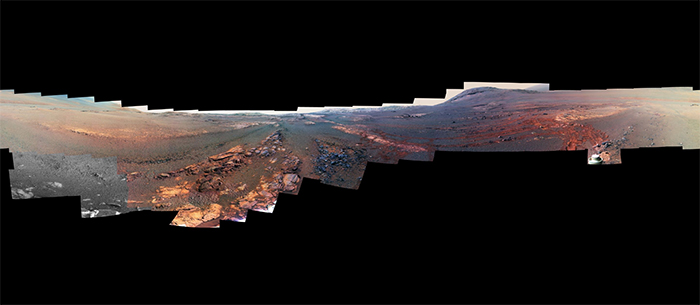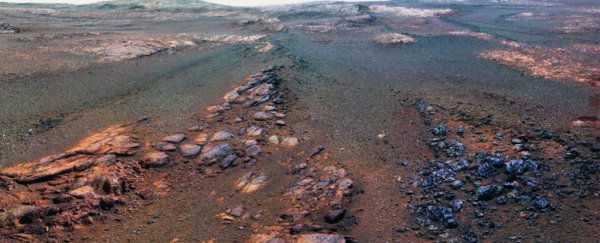Before its circuits ran cold in the shadow of a Martian dust storm, Opportunity took one long look at its surroundings and saved it for posterity.
The image represents a poignant conclusion to the rover's mission; a detailed panorama combining the most recent tracks of its marathon journey with a glimpse of the sands it would never touch.
Forget the science for a moment. Just look at it.
 (NASA/JPL-Caltech/Cornell/ASU)
(NASA/JPL-Caltech/Cornell/ASU)
Opportunity wasn't intended to run as long as it did. A mere 90 days eventually stretched into 15 solid years of rolling over the Martian sands, pumping out snapshots like a tourist who's forgotten all about their retirement.
The 360-degree image was taken from the rover's final resting place in May last year. Over 29 days, Opportunity soaked up its surroundings in a series of 354 individual snapshots before beaming them back to NASA for piecing together.
While most of them provide a colourful view of the landscape, the handful of black and white blocks in the corner were taken with fading energy, denying Opportunity the time it needed to capture the last of the scene in shades of green and violet.
"This final panorama embodies what made our Opportunity rover such a remarkable mission of exploration and discovery," says John Callas from NASA's Jet Propulsion Laboratory in Pasadena, California.
"To the right of centre you can see the rim of Endeavor Crater rising in the distance. Just to the left of that, rover tracks begin their descent from over the horizon and weave their way down to geologic features that our scientists wanted to examine up close.
"And to the far right and left are the bottom of Perseverance Valley and the floor of Endeavour crater, pristine and unexplored, waiting for visits from future explorers."
Whoever – or whatever – those future explorers will be is left to be seen.
No doubt one day a future space traveller of either human or robotic kind will rendezvous with the aged rover, and possibly even find a way to make it operational again.
Until then, the picture will go down in history with other famous snapshots of space exploration, serving as our eyes on another world.
A version of this story was first published in March 2019.
